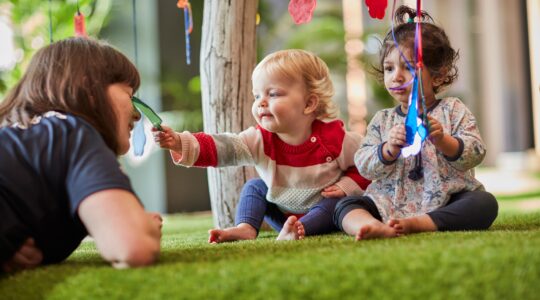Australia’s future leaders are being developed in south-east Queensland schools through a proactive engagement philosophy.
Brisbane Catholic Education is focussed on enhancing the leadership opportunities for the Year 5 and 6 students across its 107 primary schools in the region.
BCE Senior Education Advisor for Middle Years (Primary 5 and 6) Amelia Martin said leadership opportunities were embedded into the student experience at BCE primary schools, particularly in the senior primary years.
Ms Martin said these roles, regardless of whether they come with a formal title or student leader badge, provided unique opportunities and equipped students with lifelong skills.
“Student leadership opportunities are widely used and grounded in the theory that student learning outcomes are intrinsically connected to student wellbeing.”
She said by giving students in Years 5 and 6 the opportunity to embrace leadership roles it allowed them to develop essential life skills such as communication, teamwork, and problem-solving while also fostering personal growth and preparing them for life beyond school.
“These roles give students a sense of purpose and belonging within their community and offer authentic learning experiences that challenge them.”
Ms Martin said examples of the philosophy were seen across the BCE system, with many primary schools offering unique leadership opportunities.
“Students can apply for traditional roles such as school, sporting or pastoral captains, however there are also many other opportunities for students who might not naturally gravitate towards these positions.”
She said many schools support their students to lead assemblies, and encourage participation in leadership forums, entrepreneurship programs, debating competitions and innovative initiatives like STEM MAD (Making A Difference).
Many schools also foster a sense of responsibility and belonging through buddy programs and peer mediation, while encouraging connections with the local community through activities such as open days and visiting local kindergartens and aged care centres.
Ms Martin said providing students with opportunities to demonstrate responsibility in authentic and engaging learning contexts often leads to students having a stronger sense of accountability and increased engagement in their learning.
She said research from the Centre for Education Statistics and Evaluation showed students who perceived their teachers as having high expectations of them tended to perform better academically.
“A lack of responsibility has the potential to play a key role in the decline of academic performance as students transition from primary to secondary school.
“To prevent this, it’s essential that students are assigned roles and responsibilities that are age-appropriate and aligned with their individual learning.”








